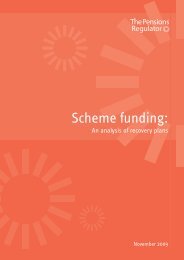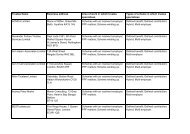Record-keeping: a consultation document - The Pensions Regulator
Record-keeping: a consultation document - The Pensions Regulator
Record-keeping: a consultation document - The Pensions Regulator
You also want an ePaper? Increase the reach of your titles
YUMPU automatically turns print PDFs into web optimized ePapers that Google loves.
2.17 <strong>The</strong> <strong>Pensions</strong> Advisory Service reports that in its experience poor<br />
administration is a major concern for members, and good record<strong>keeping</strong><br />
is essential if this situation is to improve.<br />
Question 2: Have we correctly identified the costs of poor record-<strong>keeping</strong><br />
and the benefits of good record-<strong>keeping</strong>?<br />
<strong>Record</strong>-<strong>keeping</strong> requirements of different scheme types<br />
2.18 A typical DC scheme (and GPP or AVC arrangements) requires at least<br />
12 administrative transactions a year for each active scheme member,<br />
while a typical DB scheme may only require one or two. <strong>The</strong> scope for<br />
record-<strong>keeping</strong> errors in DC schemes is therefore greatly increased.<br />
2.19 As well as recording and reconciling contributions and investments at<br />
member level, it is essential that there is a regular reconciliation of the<br />
number of units held by the investment manager against the number of<br />
units held by each member and the trustees. Ideally this should be<br />
performed following each investment or disinvestment transaction.<br />
2.20 Data for many DB schemes, on the other hand, is normally collected<br />
annually, at the scheme's renewal date, when it will be loaded to the<br />
members' records. Some schemes may, however, collect and record<br />
this information more frequently.<br />
Provision of pension scheme administration<br />
2.21 Our Governance Survey 2008 indicated that approximately four fifths<br />
(79 per cent) of trust-based schemes rely on a third party administrator<br />
(TPA) as their main provider of administration services and this has<br />
increased from two thirds (66 per cent) since 2006 as indicated in the<br />
following table:<br />
Chart 1 Administration arrangements of trust-based pension schemes 2006 -2008<br />
TPAs<br />
In-house admin<br />
Insurer<br />
12%<br />
18%<br />
6%<br />
17%<br />
10%<br />
14%<br />
66%<br />
69%<br />
79%<br />
2006<br />
2007<br />
2008<br />
2.22 Data on contract-based arrangements is more difficult to obtain.<br />
However, a 2007 estimate by a leading insurance company suggested<br />
that about two thirds of the members of contract-based schemes are in<br />
‘bundled’ arrangements, although the administration of those schemes<br />
may have been outsourced by the insurer.<br />
<strong>The</strong> <strong>Pensions</strong> <strong>Regulator</strong>: <strong>Record</strong>-<strong>keeping</strong> <strong>consultation</strong> <strong>document</strong><br />
9
















